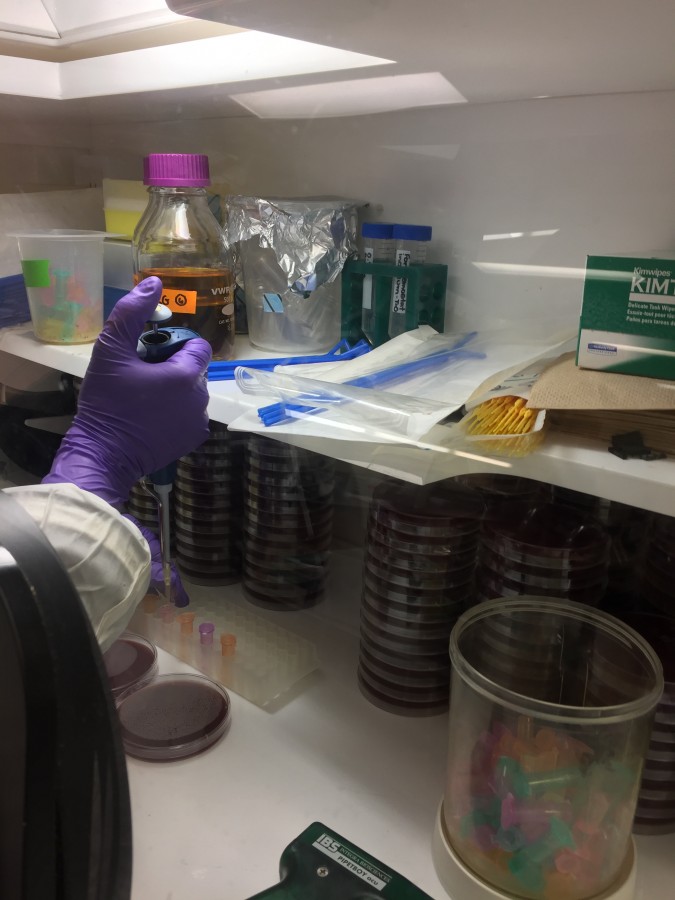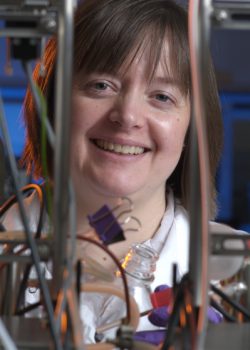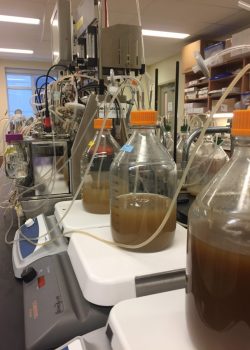
Image supplied. Courtesy of Dr. Emma Allen-Vercoe.
Going with her gut: Dr. Emma Allen-Vercoe explains why microbes aren’t the enemy
If her chosen field of research is any indication, then there’s a special place for unsung heroes in Professor Emma Allen-Vercoe’s heart. Normal human gut microbiota are currently one of the least understood parts of the human body, having been previously virtually ignored by the research community. This is unfortunate, since we depend on these microbes to help digest our food, produce certain vitamins, regulate our immune systems and keep us healthy by protecting us against disease-causing bacteria. However, thanks in part to the groundbreaking work undertaken in Allen-Vercoe’s lab in the Department of Molecular and Cellular Biology at the University of Guelph, gut microbiota are slowly revealing their secrets.
Dr. Allen-Vercoe will be at the UofM to speak about her research on August 14th at 7:00pm in the Robert Schultz Theatre in St. John’s College. Her lecture is sure to be an interesting one, the Faculty of Science interviewed her to learn more.

Dr. Emma Allen-Vercoe, Professor, Department of Molecular and Cellular Biology, University of Guelph. Image supplied.
A vital tool in Allen-Vercoe’s push to learn more about these mysterious entities is the Robogut, an anaerobic chamber which mimics the human gut and is therefore ideal for growing microbes. It is with this proprietary equipment that Allen-Vercoe is determined to dispel the popular myth that the only good germ is a dead one. The human gut microbiome is made up of trillions of microscopic organisms which interact together to perform a variety of functions, most of them not particularly well understood. Up until the middle of the last decade, the technology to properly study gut microbiota didn’t really exist. It was virtually impossible for scientists to see gut microbes, never mind study them.
“We just couldn’t see anything before with any clarity, and when you can’t see things, you tend to ignore them…. [In addition], most of the microbes that colonize the human gut are very difficult to culture. They are anaerobes or they’re very fastidious, or both. In fact, at one point they were called unculturable, which we’ve proven in my lab is patently not true.”
Speaking with Allen-Vercoe, one gets the impression that she is used to her role as an outlier. In fact, in her early days as a researcher, her advisors were taken aback when she announced her intended area of independent research. “When I look back, I can see where they were coming from at the time, they were thinking ‘how on earth are you going to study them?’ I think it just required a bit of a mind shift.”
Stressing the importance of taking a novel approach to microbiology in order to learn more, Allen-Vercoe continues: “Traditional microbiology is putting things on petri dishes and watching how they grow…. It’s a bit like going into a rainforest and finding leafcutter ants… So you pick up a few and put them in a petri dish and you take them back to your lab and you watch them walk round and round the petri dish. Now you’re going to tell me that’s what they do on the forest floor? [Today’s studies] require a different way of thinking … because a lot of the microbes that grow in the gut rely on other microbes that grow in the gut for their own wellbeing….and we’ve completely overlooked that. We have to start changing the way we think about microbiology. That’s why we do things in my lab … to try to grow the microbes as they grow in nature, as a community.”
Allen-Vercoe believes that this research is essential, given how often the public is told to eliminate bacteria, whether through the use of antibacterial soaps or antibiotics, usually with no consideration for their key role in human health.
“We’re not trying to say that [we should] go back to the time of cholera and open sewers, because we recognize now that was a big public health disaster… But we have to strike a balance. The problem is now we’ve gone too far the other way. … It takes a bit of a paradigm shift to try to understand [that] microbes are helpful to us because we’re all fed this kind of hogwash that ‘microbes are bad for you’ and ‘you need hand sanitizer’ and ‘you need to be clean all the time’ … Until that changes and people understand that microbes are important to their health, we’re not going to see a change.”
Our obsession with cleanliness has for its counterpoint animal behaviour; more specifically that of mothers and infants in the wild. To demonstrate how integral maternal microbiota exposure is to infants, Allen-Vercoe continues: “A really good example of that is whales… When a mother whale is suckling [her baby], her teats are very close to the exit of her gut. It is thought that suckling may stimulate the mum to poop. So as well as all the milk it’s getting, the baby is getting a face full of poop. It sounds really disgusting, but it’s actually a really good way to make sure that those microbes are being passed on. … You could say ‘well animals aren’t as evolved as us, we’re much cleaner and everything’, but look how far that’s got us.”
While it’s true that gut microbiota is not well understood, the impact of using drugs to indiscriminately eliminate them is far less mysterious. As an example, Allen-Vercoe cites the impact of antibiotic use on rates of childhood obesity over the past decades.

Allen-Vercoe lab. Image supplied. Courtesy of Dr. Emma Allen-Vercoe.
“There’s…a really good suggestion that antibiotic use early in life is actually extremely detrimental because [in those first five years] your body is busy trying to build a microbiome that’s going to support [your] health … for the rest of [your] life. If you come in now with an antibiotic … it has huge effects on the microbiome. Sometimes the microbiome can bounce back … and sometimes it [can’t]. What we’re seeing is emerging trends that children that were exposed to antibiotics early in life, depending on the age, antibiotic and the number of exposures, are more prone to obesity later in life. Obesity is related to having a less-than-optimal gut microbiome as well. These sorts of patterns are coming out. It’s not as easy as it sounds to see these patterns, because everyone is different, and we don’t know what half of these microbes are doing…nor how to define a truly healthy gut microbiota. So understanding all of this is very difficult.”
Allen-Vercoe points to the connection between widespread antibiotic use and increased rates of asthma and eczema in children over the past several decades. “… [W]e now know these may be to do with having a less than adequate microbial exposure during the early part of life. Part of that exposure results in the building of a microbiome in your gut which actually educates your immune system about how to respond appropriately to threats. So if you’re not getting that tuition very early in life, then you’re going to have a problem the rest of your life when your immune system recognizes things which shouldn’t be threatening as dangerous, and reacts inappropriately towards them.”
What is wanted is a holistic approach to our health. Allen-Vercoe suggests that there should really be a new medical specialty, one she calls “symbiontology”, while also acknowledging that there is a danger to creating new disciplines.
“I think medical disciplines [are] a double-edged sword. [They] encourage doctors to put themselves inside silos and not see anything else. A great example of that is autism, which in some cases a growing number of scientists believe is a gut disease which affects the brain, rather than a brain disease. But if you ask a parent of an autistic child which kind of specialist is treating their child, it will most likely be a psychiatrist.
“A psychiatrist has practically no knowledge of the microbiome (unless they’re particularly learned). A lot of these kids have gastrointestinal problems which probably has to do with the fact that they may have really strange gut microbiomes… [I]f they go and see a gastroenterologist, they don’t treat the autistic symptoms, [so] they just treat the problem of the gut…So no one is putting the dots together…. What we need is a personalized approach to nutrition and also to medicine.”
Allen-Vercoe knows she has her work cut out for her when it comes to persuading the public that the majority of bacteria aren’t inherently evil.
“What you’ve got to do is make [people] realize…how important these microbes are to [their health], and try and get people to start thinking about their microbes as part of themselves… The truth of it is that [individuals] are the guardians of their microbes, and it’s up to them to look after these microbes because [microbes] can’t look after themselves. Our gut microbes live inside us, so if we’re not looking after ourselves, we’re not looking after their habitat either. Just as we’re damaging the whole planet, we’re damaging ourselves as well.”
When asked about the impact of her research in the future, Allen-Vercoe returns to the topic of most of her public outreach sessions: “I really hope that a lasting legacy of what I’m doing is making people realize they shouldn’t be afraid of microbes. They should be afraid of some microbes – the pathogens that can cause disease, but these pathogens represent a tiny, tiny, tiny fraction of what’s out there…”
What Allen-Vercoe prefers to focus on are the potential practical benefits to come from her study of gut microbiomes. For example, she foresees a day when individuals will be able to have their microbiota assessed, much the same way they get their blood cholesterol levels tested now. With profile in hand, consumers will be able to shop for products best suited to their own microbiome, bolstering their health and even potentially allowing them to more effectively manage conditions such as depression, autism or weight loss.
It may sound far-fetched, but Professor Allen-Vercoe is used to breaking new ground:
“Science is always advancing, and in this field, it’s advancing extremely fast… I really do think that managing our microbiomes might be the way of the future,” adding with a smile: “You heard it here first.”
What: Dr. Allen-Vercoe Public Lecture. All are welcome to attend.
Topic: “Your gut microbiota: why it is important to nurture your invisible friends?” Dr. Allen-Vercoe
When: Monday, August 14, 2017, 7:00 p.m.
Where: Robert B. Schultz Lecture Theatre
A light reception will follow.
&
What: Academic Seminar
Topic: “Understanding gut microbial community dynamics using an in vitro bioreactor model”
When: Monday, August 14, 10:30-11:30 a.m.
Where: Robert B. Schultz Lecture Theatre
Research at the University of Manitoba is partially supported by funding from the Government of Canada Research Support Fund.






